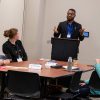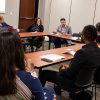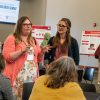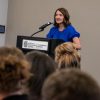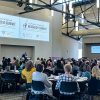
Creating connections among early childhood research, practice and policy — and how each can enhance the lives of young children and their families — provided the central theme of the 2024 CYFS Early Childhood Research Summit.
Almost 200 attendees, including researchers from across the University of Nebraska system, practitioners, administrators, community partners and policymakers, gathered April 23 at Nebraska Innovation Campus for the daylong, seventh biennial summit, which highlighted the latest research to advance early childhood education and development, and implications for practice and policy.
“Collaboration and partnership are essential to our ability to make positive impacts in the lives of young children and their families — and in the communities in which they live,” said Sue Sheridan, CYFS director, as she welcomed summit participants. “My hope is that each of you — whether you are a researcher, practitioner, administrator, community partner or policymaker — leaves today having forged new connections and strengthening existing ones.”
Keynote speaker Chrishana Lloyd, research scholar at Child Trends, discussed the relationship between research, policy and practice in early care and education, highlighting innovative approaches and strategies to advance field.
Lloyd outlined a research project on which she was involved that focused on a historical exploration of early care and education compensation, policy and solutions, particularly among Native American and Black women. The study explored the level to which the groups were minoritized and marginalized, and how the resulting systemic racism continues to have significant effects on the child care workforce.
Lloyd also discussed the work of her National Early Care and Education Workforce Center, and its future goals. One feature, the Grow Your Own campaign, draws from within communities to support a diverse, qualified and well-compensated early care and education workforce.
Grow Your Own helps launch signature services such as campaign webinars, technical assistance, facilitating connections among local innovators to build research capacity.
“What works tends to happen locally,” she said.
Lloyd emphasized the importance of flexibility in early childhood research, practice and policy.
“Turnover is a natural thing; nobody stays in one job forever,” she said. “We learn and grow and progress. When you do this work, you have to be open to growth and change.”
Throughout the day’s breakout sessions and panel discussions, research topics spanned children’s school readiness, parent engagement, special education, health and nutrition, STEM, social-emotional development, and workforce development.
Jason Prokop, director of First Five Nebraska, and Walter Gilliam, executive director of the Buffett Early Childhood Institute, also shared their thoughts with the attending educators, researchers and policymakers.
Gilliam stressed the importance of Nebraska’s policy, practice and research communities acting together to ensure positive impacts for children and their families.
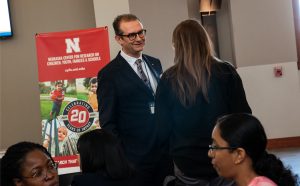
“All three elements work together to positively impact lives,” he said. “We have to make sure we communicate and collaborate to ensure that the work we’re doing is translating into meaningful change for children and their families.”
Jason Ball, president of the Lincoln Chamber of Commerce, spoke during lunch, assuring attendees that the Chamber views early childhood research and development as an integral part of Lincoln’s economic growth and future workforce development.
“We are involved in the public policy that is essential to shaping the future, collectively as a state, that will serve our families and children better,” he said.
Nick Pace, interim dean of the College of Education and Human Sciences, shared closing thoughts, noting how early childhood research drives future success. He thanked researchers for their work and collaboration in aligning research, practice and policy.
“Working together is crucial to generating the best outcomes — and to ensuring that high-quality early childhood research continues to flourish and thrive in Nebraska,” Pace said. “I know everyone here will benefit from the research information shared today, and will develop a deeper understanding of our strengths, progress and dedication to early childhood research at the University of Nebraska.”
The event concluded with a poster session that featured more than 20 graduate students showcasing their early childhood research and answering questions about their work.
The summit was presented by CYFS in partnership with the Nebraska Academy for Early Childhood Research (NAECR). Sponsors included the College of Education and Human Sciences; the Buffett Early Childhood Institute; and First Five Nebraska.
View summit videos, research presentations and posters
View #ECSummit24 Twitter posts




